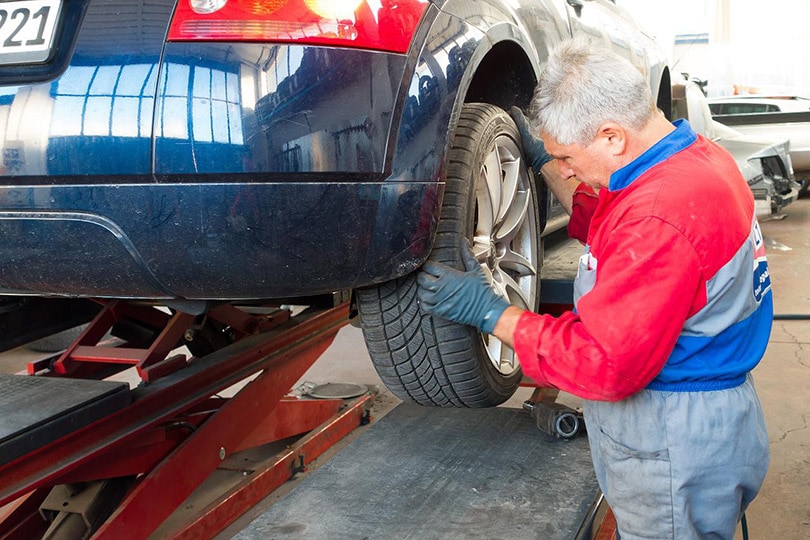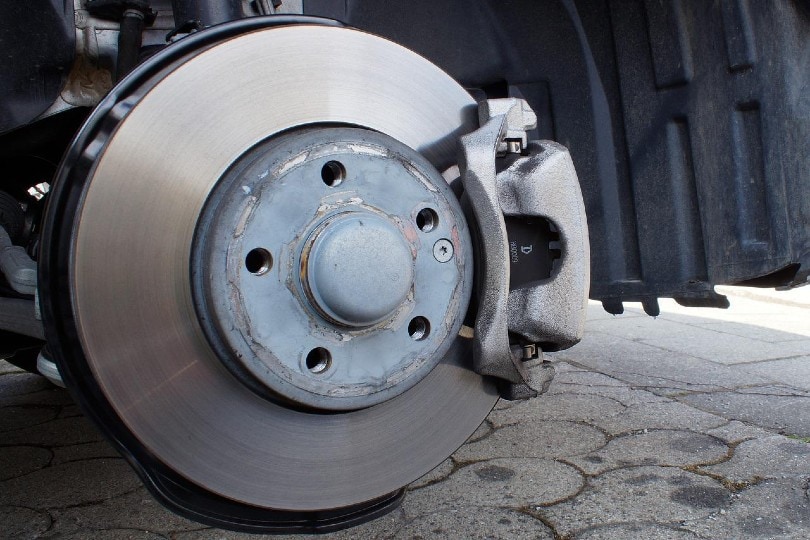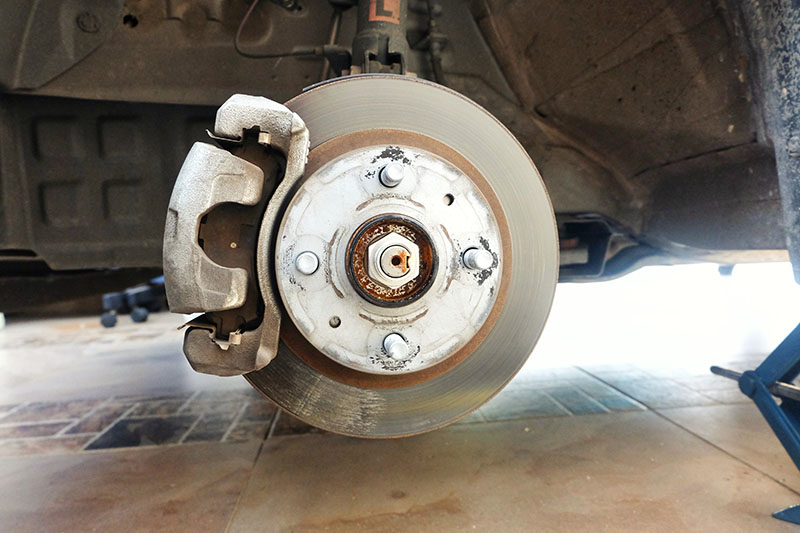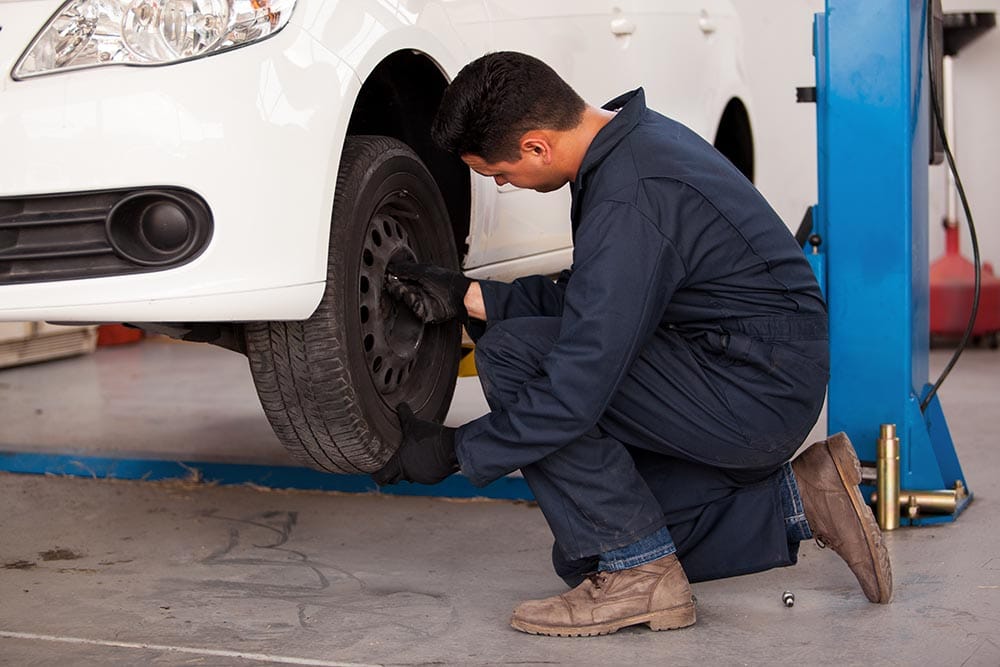Why Are My Brakes Grinding After New Pads & Rotors? 7 Causes
-
Jeff Weishaupt
- Last updated:

Almost every component of a car is prone to natural wear and tear. As a well-aware car owner, you must ensure the upkeep of your vehicles by getting them checked at a professional service now and then. However, in some cases, you may hear a grinding noise from your car even after new rotors and new pads.
Many factors can result in this grinding noise. The most common ones include rusting, metallurgy, lack of lubrication, broken shims, and more. Finding the exact cause is important to prevent further deterioration of your vehicle.
Sometimes, this grinding noise goes away after driving for some miles. Other times, the noise can be recurring, and you may have to visit a car service to resolve the issue.
This post will discuss some major causes of brake grinding after installing new pads and rotors. We will also list some ways to resolve them. So, let’s dive in.
The 7 Causes for Grinding Brakes After New Pads & Rotors
Your vehicle’s brakes can make grinding noise even after you get them checked by a professional service. While the problem can be with your vehicle’s internal system, it can also be due to some external factors.
The seven major causes of grinding noise from a car’s brake include the following:
1. Solid Objects Between Rotor and Caliper
Your car’s components can collect dirt and debris over time, especially between the rotor and caliper. While this is normal in small quantities, it can be a bigger problem when small rocks or similar objects start affecting the car’s performance.
As a result, you may hear a grinding noise from your vehicle whenever you push the brake or simply do nothing. However, remember that the actual culprit is not dust or dirt accumulation. Instead, it is solid objects between your car’s rotor and caliper.
2. Low-Quality Brake Pads
Many vehicle owners opt for low-quality brake pads just to save a few bucks. Of course, it might be the only choice when you don’t have enough budget. However, low-quality brake pads can become more costly than high-quality ones, considering the number of repairs they will require in the future.
Compared to high-quality brake pads, low-quality ones contain rough metal pieces that rub against the surface of the rotor. This results in scratches on the rotor’s surface, leading to a grinding noise. Thus, you must opt for good quality brake pads from a reliable manufacturer to prevent that.

3. Worn-out Shims
When installing new pads and rotors in your car, you might have forgotten to check its shims. If that’s the case, you might hear a loud grinding noise from your brakes.
A broken shim will scrape against your router, generating a grinding sound whenever you push the brakes. Therefore, you must ask the car repair service to check your vehicle’s shims along with pads and rotors. If there is any sign of damage, get them replaced as soon as possible.
4. Unlubricated Caliper Bolts or Brake Pads
Although it’s rare, the grinding sound from brakes can also result from unlubricated caliper bolts. A vehicle’s brake pads and caliper bolts must have enough lubrication at the point where they both connect.
Enough lubrication reduces the vibration between both components, which leads to loud brake noise. A quality auto mechanic usually lubricates the vehicle’s caliper bolts during regular maintenance.

5. Keeping the Car Idle
If you take out your car after a long while, it will likely make a grinding noise upon pressing the brakes. On average, the lifespan of a vehicle’s brake pads is 20,000 miles.
You might be wrong if you think you can elongate brake pads’ lifespan by not using your car. In reality, leaving your car idle can do more harm to its brake pads than good.
Inactivity can cause severe rusting and corrosion in your car’s internal components, including the rotors. When not treated on time, the rust spreads to other parts of the car and destroys them. You can avoid this by driving your car for some miles daily.
6. Damaged Wheel Bearing
Another cause of grinding noise from brakes is a damaged or worn-out wheel bearing. This usually happens over time, leading to loud or quiet vibrations from your vehicle’s wheels.
So, check your car’s wheel bearings if it make a grinding noise even after installing new pads and rotors. In case of any damage, switch them as soon as possible.

7. Brake Drums
Many new and older vehicles come with drum brakes in the back region. Like every other component, brake drums also require regular maintenance once in a while. Otherwise, they may get resurfaced. The cutting bit present on the brake removes the existing braking surface, revealing a new surface.
This cutting bit will create a groove-like area in the brake drum. This groove is so tiny that you may not see it from the naked eye. As the brake shoes come in contact with the new surface, they follow the furrow or groove.
If the groove has any obstacle, the shoes will snap back, hitting the backing plate. As a result, you will hear a thumping or loud grinding noise from your car.
How to Fix the Grinding Noise in Brakes
Since the grinding noise results from many factors, the best fix for your vehicle depends on the root cause of the issue. The best way to identify the cause is to take your car to a professional mechanic. However, if that’s not possible, you can perform at-home inspection methods.
Generally, vehicles make a grinding noise when solid objects get lodged between the brake pads and the rotor. So, here are some ways you can fix the grinding noise, but remember that this issue requires a long-term permanent fix.
- To remove any rock or pebble from your brake pad and rotor, you can reverse drive your car for about 50–100 feet. Doing so will remove the rock from the same route it came into your car.
- You can also try cleaning your brakes with a quality cleaner to remove all sorts of dirt accumulation from your vehicle.
- Lubricate your car’s internal components, especially caliper bolts and brake pads. When caliper bolts are dried out, the brakes don’t release smoothly, making a grinding noise.
- If you have not gotten your brake pads replaced for a long time, you must consider doing it now. Brake pads come with wear indicators that start making a grinding noise after wearing out. Worn-out brake pads are a huge safety risk.
If you cannot diagnose any of the above problems with your car, just take your car to the nearest mechanic shop.

What Happens if You Ignore Your Car’s Grinding Noise?
Ignoring the grinding noise from your car brakes can compromise your well-being and your family’s safety. Whenever you push the brake pedal, your vehicle generates massive amounts of heat through friction. This results in natural wear and tear of the brake pads, leading to damaged calipers, rotors, and shims.
Even worse, your brakes may fail completely before you know it. If you drive with faulty brakes, you become vulnerable to road accidents. That is why it is crucial to get your car checked once a month. Of course, this applies to post-installing new pads and rotors since damage to any of these components isn’t the only cause of the grinding noise.
How Long Can You Drive With the Grinding Noise?
Many car owners have reported driving their vehicles for about 2 weeks with the grinding noise. However, that’s too risky. If you don’t push the brake pads too hard, you can go for a significant amount of time with the grinding noise.
However, it is recommended to get your car checked by a professional as soon as you notice the grinding noise coming from the brake pads. Remember, installing new pads and rotors in your car doesn’t guarantee that your brakes won’t make a grinding noise anytime soon. It can happen!
Conclusion
Buying a new car can be an overwhelming experience, but keeping a check on its maintenance requirements can spoil your fun a bit. For example, worn-out brake pads and rotors can result in a grinding noise whenever you push the paddle.
However, you may also hear a grinding noise after installing new pads and rotors. Many factors can contribute to this issue, such as broken shims, a lack of lubrication, rusting, low-quality braking pads, and, more importantly, solid objects lodging between the braking pads and rotors.
It is recommended to get your vehicle checked by a professional mechanic. Alternatively, you can follow the above steps to inspect the issue with your car quickly.
Featured Image Credit: stux, Pixabay
Contents
